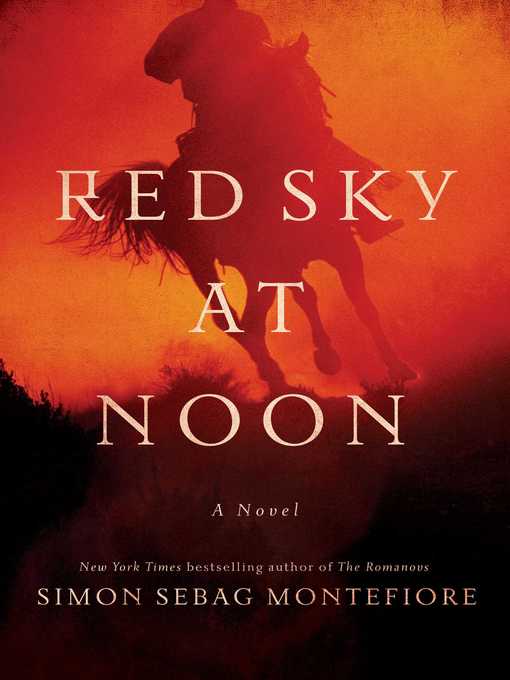
Red Sky at Noon
فرمت کتاب
ebook
تاریخ انتشار
2018
نویسنده
Simon Sebag Montefioreناشر
Pegasus Booksشابک
9781681776927
کتاب های مرتبط
- اطلاعات
- نقد و بررسی
- دیدگاه کاربران
نقد و بررسی

October 15, 2017
Focusing with romantic verve on the cavalry units deployed in the run-up to the Battle of Stalingrad, Montefiore picks up the story of Benya Golden, a lover of the titular protagonist of Sashenka. Benya was a political prisoner in the Gulag when Stalin's Order 227 created penal battalions whereby prisoners could redeem themselves by fighting for the Motherland. Benya is allowed to join a mounted unit battling on the shores of the Don River. In a febrile medley of Italian and German invaders, Cossack partisans, and Soviet defenders, Benya earns not only the respect of his criminal compatriots but also the love of an Italian nurse. In an intense counterpoint, Stalin's daughter Svetlana Stalina carries on a torrid teenage love affair in Moscow. Montefiore has legions of fans for his histories (The Romanovs), but his "Moscow Trilogy"(One Night in Winter; Sashenka) opens the floodgates to the imaginative re-creation of archival facts. VERDICT Benya's story animates a ten-day, desperate struggle in Stalin's huge gamble against the Nazi war machine. World War II fiction aficionados will want to read this.--Barbara Conaty, Falls Church, VA
Copyright 2017 Library Journal, LLC Used with permission.

October 15, 2017
Montefiore's (The Romanovs, 2016, etc.) World War II novel traces 10 eventful days in the life of Benya Golden, a Russian political prisoner who has joined the fight against the Nazis. It's July 1942, and the Russian army is in disarray: though they are still officially on the Allied side, many soldiers have defected and joined the fight for Hitler. But Russians on both sides, as depicted by Montefiore, are invariably monsters who rape and murder at the slightest provocation. So it makes little sense that Golden, a writer in his 40s who's been a prisoner and a soldier but has never killed anyone, has survived to this point--especially since his regiment of prisoners is deemed expendable by Stalin and sent on a series of suicide missions. The book doesn't really come to life until the middle, when Golden, who has strayed from his regiment and been wounded, falls in love with Fabiana, the Italian nurse who saves his life. Pursued as a Jew by the Nazis and as a defector by the Allies, Golden must choose between losing his love and endangering her life. This gives the book all the romance it needs, but Montefiore also adds a subplot in which Stalin's daughter falls in love with a wartime journalist. These sections underline his point about Stalin's brutality but are sentimentally written and do little to advance the story. A novel this ambitious could use a little more moral nuance, as the characters are either all good or (in most cases) all evil. Yet the gritty war scenes and the lovers' pursuit keep the pages turning.
COPYRIGHT(2017) Kirkus Reviews, ALL RIGHTS RESERVED.

Starred review from October 30, 2017
Montefiore’s third novel in his Moscow Trilogy (after Sashenka and One Night in Winter) is a stunning World War II story set on the bloody Russian front outside Stalingrad in July 1942. Benya Golden is a Jewish writer and political prisoner unjustly convicted of treason and sentenced to 10 years in the gulag. Stalin organizes criminals, convicts, and political prisoners into penal battalions known as Smertniki, the Dead Ones, who are thrown into battle as cannon fodder to be redeemed only by combat death or wounds. Benya is assigned to a penal Cossack cavalry regiment that becomes trapped behind enemy lines after a disastrous frontal assault. Only Benya and six other men survive the attack. They link up with a band of partisans, not knowing they are part of a high-level Russian deception plan involving Stalingrad’s defense. Ambush, capture, escape, interrogation, and execution await the Smertniki, as the Germans and their Axis allies and the Russians slaughter each other. Benya’s brief, intense romance with an Italian nurse gives him hope where he expects only death, but there is one more mission he must complete before his life is redeemed. (Stalin and his daughter Svetlana play a role in this story, too.) Montefiore’s immersive portrayal of the Eastern Front makes this a gripping, convincing tale.

Starred review from November 1, 2017
Historian, biographer, and novelist Montefiore has garnered critical acclaim and commercial success (The Romanovs, 2016) in each discipline, and his latest demonstrates his deftness in crafting a deeply engaging story that is only enriched by his skills. Set in a 10-day period in the summer of 1942, the narrative finds Joseph Stalin facing the collapse of Russian forces before a massive Wehrmacht assault aimed at Stalingrad and the oil fields of the Caucasus. Stalin's response was the formation of penal battalions of mounted cavalry drawn from prisoners in the country's vast Gulag. To humanize a campaign involving millions of combatants, Montefiore gives readers Benya Golden, a 42-year-old Jewish writer expecting to die in Kolyma, the most barbaric of Gulag prisons. Benya's first action is a nearly suicidal attack behind enemy lines, and Montefiore's portrayal of the chaos of hooves, swords, and gunfire is visceral. Wounded and captured, Benya is treated by an Italian nurse, which leads to an affair that the lovers must measure in hours. As he did in his landmark biography Stalin: The Court of the Red Tsar (2004), Montefiore portrays the Soviet leader as being less paranoid and more human when surrounded by his advisors. He also inserts Stalin's daughter, Svetlana, into the story, showing the pretty, sensitive 16-year-old to be lovelorn because boys are terrified to approach her. Offering historical accuracy, a fine empathy for his characters, and a story that illuminates the operatic tragedy of Stalin's rule, Red Sky at Noon is brilliant on multiple levels.(Reprinted with permission of Booklist, copyright 2017, American Library Association.)

























دیدگاه کاربران